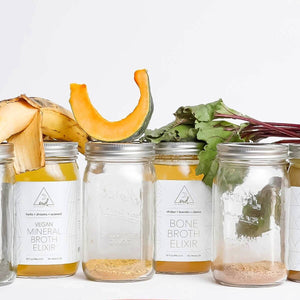
Bone broth, a nutritious and flavorful liquid made by simmering animal bones, connective tissues, and various seasonings for an extended period, has become increasingly popular in recent years. A healthy immune system is essential for fighting off infections and maintaining overall health, and incorporating bone broth into your diet may provide a variety of immune-boosting benefits. This blog post will delve into the immune-supporting advantages of bone broth and offer guidance on how to include it in your meal plan.
Rich Source of Essential Minerals and Vitamins
One of the benefits of bone broth is that it contains essential minerals and vitamins that support immune function. Rich in essential nutrients, bone broth serves as a versatile dietary supplement that can help fortify the body's natural defenses. Here's a more detailed look at some of the key nutrients found:
- Calcium and Phosphorus: These minerals are fundamental to our health, especially in supporting strong bones and teeth. In bone broth, calcium, and phosphorus are leached from animal bones during the long simmering process, making them highly bioavailable. This means they can be more easily absorbed by the body, enhancing their effectiveness in bone maintenance and immune regulation. The slow cooking of bones in water, sometimes with a splash of vinegar to aid mineral extraction, results in a nutrient-rich broth that supports skeletal strength and metabolic processes essential for immune defense.
- Magnesium: Found in bone broth, magnesium is crucial for maintaining numerous bodily functions, including muscle and nerve function, heart rhythm, and immune system support. It aids over 300 enzymatic reactions, including those vital for the synthesis of proteins, and the transmission of nerve impulses. Consuming magnesium through bone broth can be particularly beneficial as it is in a form that the body can easily absorb and utilize, thus contributing effectively to overall health and immune function.
- Vitamin D: Often highlighted for its role in immune health and bone density, vitamin D is another valuable component of natural bone broth, especially when it is made from fish bones. Vitamin D not only helps regulate calcium and phosphorus in the body but also plays a critical role in immune system modulation. Its presence in bone broth can be particularly advantageous during the colder months or for individuals with limited sun exposure, providing a dietary source of this often-deficient vitamin.
Incorporating it into your diet can be a simple yet powerful way to enhance your nutrient intake and support various aspects of health, particularly immune function. With its rich content of minerals and vitamins, bone broth stands out as a natural and effective way to nourish the body and maintain essential bodily functions.
Amino Acids
Bone broth contains various amino acids that contribute to a robust immune system. One such amino acid, glycine, has been shown to possess powerful anti-inflammatory properties. Inflammation is a natural immune response, but chronic inflammation can lead to numerous health issues; thus, glycine's ability to modulate this response is crucial. Glycine also supports gut health, a key aspect of overall immunity, by helping to maintain the integrity of the intestinal lining. A healthy gut barrier prevents unwanted pathogens from entering the bloodstream and provokes a balanced immune response, thereby reducing the incidence of autoimmune reactions and allergies.
Proline, another critical amino acid, plays a pivotal role in collagen synthesis, which is vital for maintaining the strength and elasticity of the skin. Since the skin is the body's first barrier against environmental threats, its health directly impacts immune effectiveness. Proline-rich broths help ensure that the skin remains not only resilient but also capable of performing its protective functions effectively. Moreover, the presence of collagen aids in wound healing and reduces the potential for infections that can compromise the immune system.
Finally, glutamine, considered an essential amino acid for immune health, is abundantly present in bone broth. Glutamine is vital for the proliferation of immune cells, particularly lymphocytes, which play a significant role in defending against pathogens. It also supports the health of the intestinal mucosa, which houses a substantial portion of the body's immune cells. This relationship emphasizes the importance of a well-functioning digestive system for optimal immune response.
Collagen and Gelatin
The intricate connection between gut health and immune function is a fundamental aspect of human biology, as a significant proportion of the body's immune cells are housed within the gastrointestinal tract. Collagen, a primary structural protein found abundantly in bone broth, plays a critical role in this dynamic. It aids in repairing and maintaining the gut lining, which acts as a barrier to protect the body from pathogens and toxins. When the gut lining is intact and healthy, it prevents unwanted substances from entering the bloodstream and triggering inflammatory responses, which are potentially harmful to immune function. Consuming collagen-rich bone broth can thus be a vital dietary practice for enhancing gut integrity and, consequently, supporting robust immune defense mechanisms.
Gelatin, which is produced by breaking down collagen during the bone broth cooking process, also significantly benefits gut health. It has unique properties that reduce inflammation within the gut, a common source of many chronic health issues. Gelatin’s viscous nature allows it to bind with water and other fluids, promoting smoother digestion by helping food move easily through the GI tract. This process aids in the absorption of nutrients by making them more accessible to the gut's mucosal lining. Moreover, gelatin naturally attracts digestive juices to the food, enhancing enzymatic actions and improving nutrient breakdown and assimilation. Through these mechanisms, gelatin not only supports gut health but also establishes a conducive environment for the immune system to function effectively.

Bone Broth as an Anti-Inflammatory Agent
Managing inflammation is a cornerstone in the maintenance of overall health, particularly for its role in supporting a robust immune system. Chronic inflammation can undermine immune function and is associated with various health complications, such as autoimmune diseases, arthritis, and heart conditions. As discussed, bone broth, a nutrient-dense liquid obtained from simmering the bones and connective tissues of animals, is particularly rich in compounds that combat inflammation. Among these are chondroitin sulfates and glucosamine, which are naturally found in the cartilage of animals. These compounds have well-documented roles in reducing inflammation and maintaining joint health. When bone broth is prepared, these substances are released into the broth, providing a direct source of anti-inflammatory agents.
The mechanisms by which chondroitin sulfates and glucosamine exert their effects are primarily through their contribution to the repair and maintenance of cartilage, the rubber-like tissue that cushions joints. Over time, or due to injury, cartilage can degrade, leading to joint pain and stiffness, hallmarks of inflammatory joint diseases like osteoarthritis. By providing the building blocks for cartilage repair, these compounds can alleviate symptoms of inflammation and prevent further joint degradation. Glucosamine helps inhibit the production of inflammatory cytokines and promotes the production of anti-inflammatory agents within the body. This dual action not only assists in managing joint health but also aids in maintaining a balanced immune response, crucial for preventing overactive inflammatory processes that can lead to chronic health issues.
Incorporating Bone Broth into Your Diet
When it comes to adding bone broth to your meal plan, you can choose between homemade and store-bought options. Homemade broth allows for control over the ingredients and cooking time, while store-bought options offer convenience. When selecting the best bone broth from store shelves, opt for organic bone broth with minimal additives and preservatives to ensure the highest quality. There are also numerous creative ways to incorporate it into your meals:
- Cooking Grains: Substitute water with bone broth when preparing grains like rice or quinoa. This simple modification not only enhances their flavor, making them more appetizing but also boosts their nutritional value. The minerals and vitamins leached from the bones into the broth infuse the grains, transforming a basic side dish into a vital source of nutrients. This method is especially effective in dishes where the grain serves as a primary component, enhancing both the health benefits and the taste profile of meals.
- Soups, Stews, and Sauces: Utilize bone broth as the base for soups, stews, and sauces to deepen their flavor and enrich their nutritional content. The complex flavors and essential nutrients provided by the broth enhance the overall quality of these dishes, making them more satisfying and beneficial for health. This use of bone broth can turn a simple soup into a healing meal and bring a gourmet touch to homemade sauces and stews, offering a hearty and wholesome option for any table.
- Warm Beverage: Enjoy a warm mug of bone broth as a comforting drink on cool days or whenever you need a nourishing boost. This soothing beverage offers a wealth of health benefits, including a rich supply of minerals, collagen, and amino acids. Drinking bone broth can be a restorative alternative to coffee or tea, providing a calming and healthful option that supports digestion and joint health.
- Braising Liquids: Employ bone broth as a braising liquid to cook meats and vegetables. This technique not only enhances the flavor and tenderness of your dishes but also maximizes nutrient absorption. The savory depth added by the bone broth enriches the food, making it juicier and more flavorful. This method is particularly effective for tougher cuts of meat, as it ensures they become tender and rich in flavor, resulting in dishes that are both delicious and nutrient-packed.
- Smoothies: Add a small amount of bone broth to smoothies, particularly savory ones, to increase their nutritional value without altering their flavor significantly. This innovative approach allows you to infuse your beverages with essential proteins and a broad spectrum of minerals. It’s an easy and subtle way to enhance the nutrient density of your smoothies, making them not only refreshing but also beneficial for your health.
Incorporating it into various aspects of your cooking routine not only enhances the flavor and appeal of your meals but also significantly boosts your nutritional profile. Whether used in grains, soups, or even smoothies, bone broth can provide a multitude of health benefits while adding depth and richness to your dishes.
For those looking to further capitalize on the benefits of bone broth, consider participating in a bone broth cleanse or bone broth detox. These programs involve consuming this broth as the primary source of nutrition for a short period, usually lasting a few days, to help restore gut health, reduce inflammation, and support immune function. A broth cleanse can be a great way to give your body an extra boost and start fresh with healthy habits. It can also support weight management goals by providing a feeling of fullness with relatively few calories, thus reducing the temptation to indulge in unhealthy snacks or overeat.

Bone broth not only serves as a rich source of vital nutrients but also plays a significant role in supporting and strengthening the immune system through its diverse components. The various benefits of bone broth, from its mineral and vitamin content to its amino acids and collagen, highlight its role as a powerful dietary supplement. Regular consumption of this broth can help reduce inflammation, support gut health, and enhance the body's natural defense mechanisms, all of which are crucial for maintaining overall health. Additionally, the versatility of bone broth in cooking—whether used as a base for soups and stews, a cooking liquid for grains or enjoyed as a soothing drink—makes it an accessible and beneficial addition to any diet. For those seeking to optimize their health, incorporating it into a daily routine could be a simple yet effective strategy to bolster the immune system, improve digestive health, and maintain a balanced internal environment. As we continue to explore the nutritional potential of traditional foods, bone broth stands out as a timeless and valuable element of a holistic approach to wellness.





